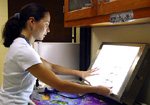Graduate leaves legacy of involvement
by Mary
Helen YarboroughPublic Relations
Petra “Peko” Akiko Tsuji’s life reflects a great humanitarian’s theory that advises us to work all we can to improve this world now, as there is an eternity for rest later.
 Dr. Peko Tsuji
conducts research in a lab.
Dr. Peko Tsuji
conducts research in a lab.Tsuji has given herself little chance to slow down since coming to the United States to fulfill her academic and civic goals. Having earned her Ph.D. from MUSC’s College of Graduate Studies, Tsuji did it the hard way by most accounts. As a student at the College of Charleston earning an advanced degree in marine biology, she was inspired by a presentation from Thomas Walle, Ph.D., MUSC professor of cell and molecular pharmacology.
“While I was earning my [Master of Science] degree at the College of Charleston, I entered MUSC and began work on my Ph.D. I must have been crazy. Your social life comes to a screeching halt!” said Tsuji, a slight, Eurasian ball of energy who earned her bachelors degree in biology from the Johann Wolfgang von Goethe University in Frankfurt, Germany, where she studied the spatial memory of homing pigeons and attained an equivalent Master of Science in zoology.
So while others were socializing, Tsuji was finishing her master's, pursing her Ph.D. in biomedicine, and volunteering for Charles Towne Landing, Habitat for Humanity, Coastal Clean-up Blitz, Taste of Charleston and Charleston County Library, among a host of other things.
Born in Russesheim, Germany, Tsuji became a naturalized American citizen in 2003. “There is not much volunteerism in Germany,” she said. “I love that about America. I love to teach. The common theme is helping others excel. … And there is a great need for female role models in science and otherwise. I’d like to become such role model.”
When she wasn’t volunteering, she was active in promoting student initiatives at MUSC through a plethora of roles. She served as president of the International Student Association, executive officer of the Student Government Association, student representative of the Women’s History Month Committee, vice president of the Multicultural Graduate Student Association; she was a student representative for the Graduate Student Association and Student Diversity Advisory Committee to the University Diversity Council—and she was an MUSC presidential scholar.
Her work history also is diverse. She has worked as a veterinary assistant at the emergency clinic, an assistant ranger, teaching assistant, and research assistant at the S.C. Department of Natural Resources.
“I once wanted to become a vet and do veterinary research,” she said. Why didn’t she? ”Because many pet owners are a difficult breed,” she explained, “which makes helping their animals nearly impossible.”
The academic side to Tsuji is equally unique. Her dissertation involved using fish as models for certain cancer research, which was an adaptation of her knowledge of aquatic life and environmental sciences.
“Most research studies involve in vivo models. In my case, I used a small saltwater fish model , a vertebrate. They swallow water the same as mammals,” she said, explaining that certain carcinogens enter a body the same way, such as in water that is ingested. She remains intrigued with marine biology and the vast resources that lie in the ocean depths. “The ocean is our greatest untapped resource,” she said, adding that it would not surprise her if the ocean possessed substances that could provide treatment for cancer and other diseases. Her dissertation research involved methoxylated flavones, a class of naturally-occurring dietary compounds, as potential cancer preventative agents using human and fish models.
Armed with her doctorate from MUSC and a bounty of human spirit, Tsuji is on her way to the National Cancer Institute in Bethesda where she will spend the next several years as a cancer prevention fellow. She is most interested in studying the role that diet plays in cancer.
And while she adjusts to life inside the Capital Beltway, she credits her mother with the inspiration and drive to keep going—and enjoying life along the way.
“I’m a lot like my mother,” she said with a smile. “My mother let me experience things because of my interests. She has always stayed young at heart. I’d like to do the same always.”
At 65, Peko’s mother challenged teenagers to a tennis match in Germany where she lives. She must have played them pretty well, because the children came back and asked for more, Tsuji said. Like mother, like daughter, there is always more.
“Peko was an outstanding graduate student who not only excelled in research, but also played an important leadership role in the graduate school and on campus,” said Perry Halushka, M.D., Ph.D., Graduate Studies dean. “Her leadership, enthusiastic personality and energy will be missed in our college and on our campus.”
Peko couldn't have made it without:
1. A good mentor who was my biggest critic and strongest supporter
2. Good friends and family
3. Balance (exercise, hobbies, dance, student activities, surfing)
4. Combining discipline, desire and determination to meet a goal
5. A belief in one's ability to succeed
Friday, May 18, 2007
Catalyst Online is published weekly,
updated
as needed and improved from time to time by the MUSC Office of Public
Relations
for the faculty, employees and students of the Medical University of
South
Carolina. Catalyst Online editor, Kim Draughn, can be reached at
792-4107
or by email, catalyst@musc.edu. Editorial copy can be submitted to
Catalyst
Online and to The Catalyst in print by fax, 792-6723, or by email to
catalyst@musc.edu. To place an ad in The Catalyst hardcopy, call Island
Publications at 849-1778, ext. 201.